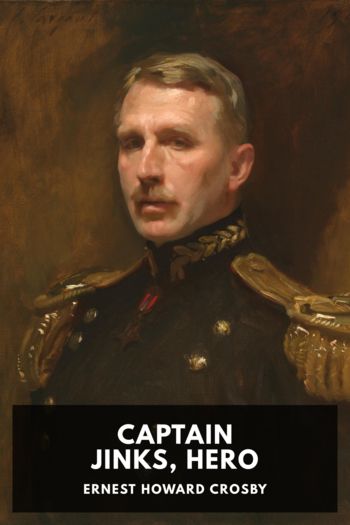Captain Jinks, Hero by Ernest Howard Crosby (story read aloud txt) 📕

- Author: Ernest Howard Crosby
Book online «Captain Jinks, Hero by Ernest Howard Crosby (story read aloud txt) 📕». Author Ernest Howard Crosby
“We have been told, my friends, by wicked and unpatriotic scoffers, that these wars have stirred up the passions of our people, that there are more lynchings and deeds of violence than ever before, and that negro soldiers returning from the war have shot down citizens from car-windows. I have even been told that its effect is to be seen in the attempts of worthy citizens, including a distinguished judge, to have the whipping-post reestablished in our midst. I can only say for myself that such traitors and traducers should be the first victims of the whipping-post. (Cheers.) So far from crime having increased since the departure of these young heroes, I can testify that there has been a marked decrease in our community. Since they left, not a single barn has been burned, not a chicken stolen. My friend, Mrs. Crane, informs me that she keeps more chickens than ever before, and that she has not missed one in over a year. I am also told that during the absence of these young men the amount of liquor drunk in our town has sensibly diminished. The war then has been a blessing to us and to our nation.”
During these remarks Josh Thatcher, who was sitting in the front row, gave sundry digs in the ribs to his cousin Tom, and they both laughed aloud.
“We welcome our heroes back,” continued the orator. “We open our arms to them. All that we have is theirs. We applaud their manly courage and Christian self-sacrifice. We shall never, never forget their services, and we shall recite their noble deeds to our children and to our children’s children.”
The meeting broke up with three cheers and a tiger for each of the four heroes. For an hour later the crowds stood in the street talking over the great events of the day, each of the young veterans forming the center of an admiring group, Tom Thatcher being surrounded by a bevy of pretty girls who seemed to find nothing objectionable in his pimpled face and hoarse voice. Cleary stood for a long time watching them and talking with the insurance man.
“It’s their night,” said the latter, “but it won’t last long. We know them too well. When the barns begin to burn again, folks’ll all know what it means. I wish they’d keep a war going a long way off forever for these fellows. It would be a good riddance. And that’s all talk of old Taylor’s anyway. He won’t take them to his heart, not by a great deal. I heard Dave Black ask him for a job today, and he wants a man too, and he said, ‘What—an ex-soldier? Not much!’ The words were out of his mouth before he knew what he’d said. He’s a slick one.”
When Cleary returned to Mr. Jinks’ house, he found Sam much worse, and the gravest fears were entertained as to his recovery. In the morning he was a little easier, and Cleary was able to have a little talk with him before he left. Sam had been told by the doctor that his condition was serious, and he had no desire to get well.
“You must brace up, old man,” said Cleary cheerily. “I’ll come back in a few days and we’ll lay out our plans for the future. You’re the finest soldier that ever lived, and I haven’t done with you yet.”
“Don’t say that, don’t say that!” cried Sam. “I’m no soldier at all. I wanted to be a perfect soldier, and I can’t. It’s that that’s breaking my heart. I don’t mind the nomination for President nor anything else in comparison. My poor wife! Why did I let her marry a coward like me? I can’t tell you now, but if I’m alive when you come here again I’ll tell you all.”
“Nonsense, old man,” said Cleary. “You’ve got the fever on you again. It’s in your blood. When it gets out, you’ll be all right.”
It was with tears in his eyes that Cleary bade his friend goodbye, for he could see that he was a very sick man. It was impossible, however, for him to remain longer, and as Sam’s wife and cousin were there to nurse him, and his father and mother had been telegraphed for, he felt that there was no necessity for him to remain.
After the lapse of three weeks Cleary received the sad news that Sam had shown unmistakable signs of insanity and had been removed to an insane asylum. His father wrote that while his insanity was of a mild form, the doctors thought it best for him to be placed in an institution where he could receive the most scientific treatment. Six months later Cleary, who was now one of the editors of the Lyre, went on a sad pilgrimage to see his friend. The asylum was several hours away from the metropolis beyond East Point, and was none other than the great building which they had described to the chief of the Moritos. Cleary took a carriage at the station and drove to his destination, and at last arrived at the huge edifice in the midst of its wide domain. He went into the reception-room and explained his errand. After a while a young doctor came to him, and told him that he could have an interview with Captain Jinks at once, and offered to act





Comments (0)